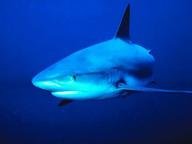Quiz Answer Key and Fun Facts
1. How large is the average shark?
2. On the average, how many confirmed shark attacks are there every year, world-wide?
3. Most shark attacks occur in water over 10 feet deep.
4. Which is not a common kind of shark attack?
5. Some sharks have very strange and fanciful names. Which one of these is not a shark?
6. You are 16.5 times more likely to be hit by lightning than to be attacked by a shark.
7. Let's talk about some basic safety rules. What are some common-sense rules for avoiding run-ins with sharks?
8. Sharks can range in size from 7 inches to 46 feet.
9. A shark's upper jaw detaches from its skull when it bites.
10. Stretching nets across mouths of bays has been very successful in some places at keeping sharks out. Why is this method not used more widely?
11. When threatened, one species of shark takes in water causing it to grow larger.
12. Which one of these is NOT one of the three most dangerous sharks to people?
13. Which one of these is an effective anti-shark weapon?
14. 'Bruce', the mechanical shark used in the movie 'Jaws' is an accurate, life-sized model of a real great white shark.
15. Shark populations are declining. Which of the following is a cause of this decline?
Source: Author
skunkee
This quiz was reviewed by FunTrivia editor
crisw before going online.
Any errors found in FunTrivia content are routinely corrected through our feedback system.

